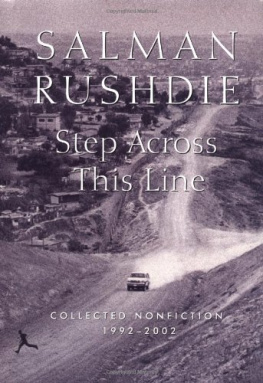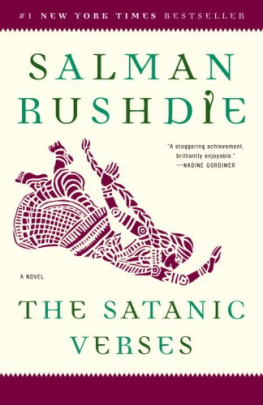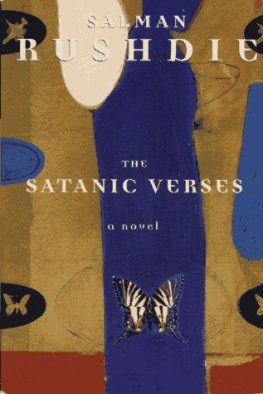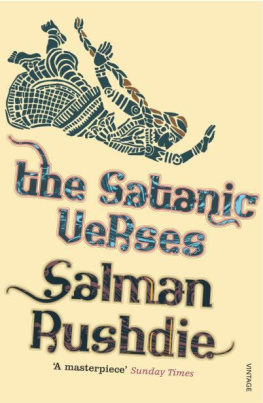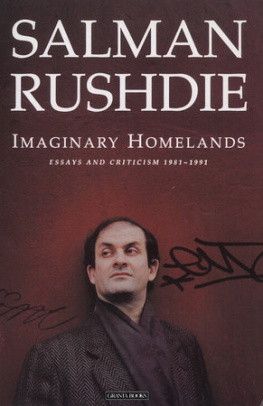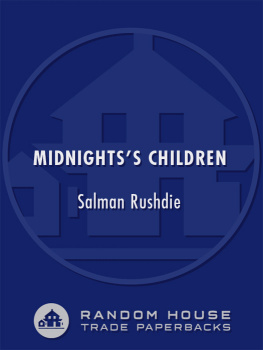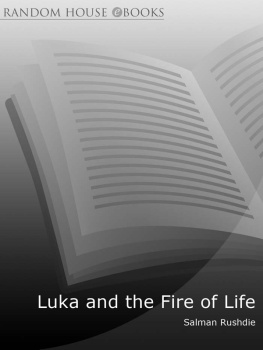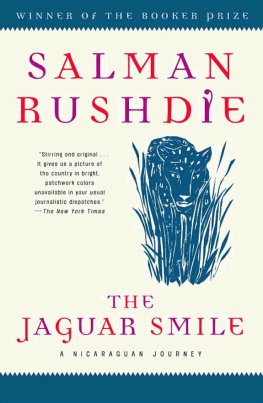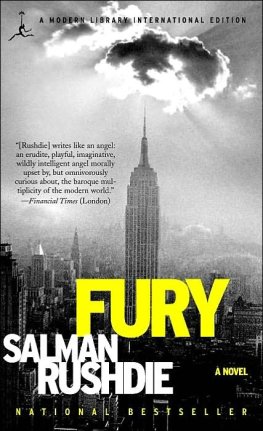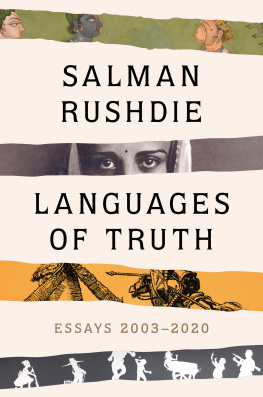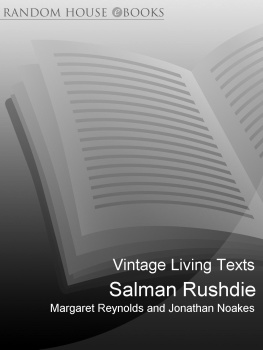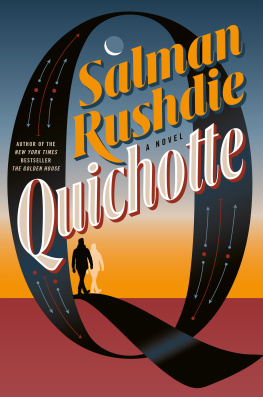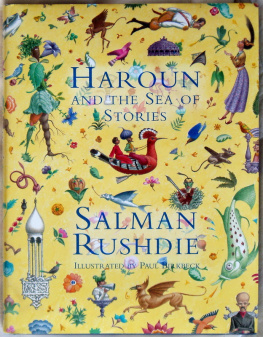Contents
TO CHRISTOPHER HITCHENS
PART I Essays
Out of Kansas
I wrote my first short story in Bombay at the age of ten. Its title was Over the Rainbow. It amounted to a dozen or so pages, was dutifully typed up by my fathers secretary on flimsy paper, and was eventually lost somewhere along my familys mazy journeyings between India, England, and Pakistan. Shortly before my fathers death in 1987, he claimed to have found a copy moldering in an old file, but despite my pleadings he never produced it. Ive often wondered about this incident. Maybe he never really found the story, in which case he had succumbed to the lure of fantasy, and this was the last of the many fairy tales he told me. Or else he did find it, and hugged it to himself as a talisman and a reminder of simpler times, thinking of it as his treasure, not minehis pot of nostalgic, parental gold.
I dont remember much about the story. It was about a ten-year-old Bombay boy who one day happens upon the beginning of a rainbow, a place as elusive as any pot-of-gold end zone, and as rich in promise. The rainbow is broad, as wide as the sidewalk, and constructed like a grand staircase. Naturally, the boy begins to climb. I have forgotten almost everything about his adventures, except for an encounter with a talking pianola whose personality is an improbable hybrid of Judy Garland, Elvis Presley, and the playback singers of the Hindi movies, many of which made The Wizard of Oz look like kitchen-sink realism.
My bad memorywhat my mother would call a forgetteryis probably a blessing. Anyway, I remember what matters. I remember that The Wizard of Oz (the film, not the book, which I didnt read as a child) was my very first literary influence. More than that: I remember that when the possibility of my going to school in England was mentioned, it felt as exciting as any voyage over rainbows. England felt as wonderful a prospect as Oz.
The wizard, however, was right there in Bombay. My father, Anis Ahmed Rushdie, was a magical parent of young children, but he was also prone to explosions, thunderous rages, bolts of emotional lightning, puffs of dragon smoke, and other menaces of the type also practiced by Oz, the great and terrible, the first Wizard Deluxe. And when the curtain fell away and we, his growing offspring, discovered (like Dorothy) the truth about adult humbug, it was easy for us to think, as she did, that our wizard must be a very bad man indeed. It took me half a lifetime to discover that the Great Ozs apologia pro vita sua fitted my father equally well; that he too was a good man but a very bad wizard.
I have begun with these personal reminiscences because The Wizard of Oz is a film whose driving force is the inadequacy of adults, even of good adults. At its beginning, the weaknesses of grown-ups force a child to take control of her own destiny (and her dogs). Thus, ironically, she begins the process of becoming a grown-up herself. The journey from Kansas to Oz is a rite of passage from a world in which Dorothys parent-substitutes, Auntie Em and Uncle Henry, are powerless to help her save her dog, Toto, from the marauding Miss Gulch, into a world where the people are her own size, and in which she is never treated as a child but always treated as a heroine. She gains this status by accident, its true, having played no part in her houses decision to squash the Wicked Witch of the East; but by the end of her adventure she has certainly grown to fill those shoesor, rather, those famous ruby slippers. Whod have thought a girl like you could destroy my beautiful wickedness? laments the Wicked Witch of the West as she meltsan adult becoming smaller than, and giving way to, a child. As the Wicked Witch of the West grows down, so Dorothy is seen to have grown up. In my view, this is a much more satisfactory explanation for Dorothys newfound power over the ruby slippers than the sentimental reasons offered by the ineffably soppy Good Witch Glinda, and then by Dorothy herself, in a cloying ending that I find untrue to the films anarchic spirit. (More about this later.)
The helplessness of Auntie Em and Uncle Henry in the face of Miss Gulchs desire to annihilate Toto the dog leads Dorothy to think, childishly, of running away from homeof escape. And thats why, when the tornado hits, she isnt with the others in the storm shelter, and as a result is whirled away to an escape beyond her wildest dreams. Later, however, when she is confronted by the weakness of the Wizard of Oz, she doesnt run away but goes into battlefirst against the Witch and then against the Wizard himself. The Wizards ineffectuality is one of the films many symmetries, rhyming with the feebleness of Dorothys folks; but the difference in the way Dorothy reacts is the point.
The ten-year-old boy who watched The Wizard of Oz in Bombays Metro cinema knew very little about foreign parts and even less about growing up. He did, however, know a great deal more about the cinema of the fantastic than any Western child of the same age. In the West, The Wizard of Oz was an oddball, an attempt to make a live-action version of a Disney cartoon feature despite the industrys received wisdom (how times change!) that fantasy movies usually flopped. Theres little doubt that the excitement engendered by Snow White and the Seven Dwarfs accounts for MGMs decision to give the full, all-stops-out treatment to a thirty-nine-year-old book. This was not, however, the first screen version. I havent seen the silent film of 1925, but its reputation is poor. It did, however, star Oliver Hardy as the Tin Man.
The Wizard of Oz never really made money until it became a television standard years after its original theatrical release, though it should be said in mitigation that coming out two weeks before the start of World War II cant have helped its chances. In India, however, it fitted into what was then, and remains today, one of the mainstreams of Bollywood film production.
Its easy to satirize the Indian commercial cinema industry. In James Ivorys film Bombay Talkie, a journalist (the touching Jennifer Kendal, who died in 1984) visits a studio soundstage and watches an amazing dance number featuring scantily clad nautch girls prancing on the keys of a giant typewriter. The director explains that this is no less than the Typewriter of Life, and we are all dancing out the story of our Fate upon that mighty machine. Its very symbolic, the journalist suggests. The director, simpering, replies: Thank you.
Typewriters of Life, sex goddesses in wet saris (the Indian equivalent of wet T-shirts), gods descending from the heavens to meddle in human affairs, magic potions, superheroes, demonic villains, and so on have always been the staple diet of the Indian filmgoer. Blond Glinda arriving in Munchkinland in her magic bubble might cause Dorothy to comment on the high speed and oddity of local transport operating in Oz, but to an Indian audience Glinda was arriving exactly as a god should arrive: ex machina, out of her divine machine. The Wicked Witch of the Wests orange puffs of smoke were equally appropriate to her super-bad status. But in spite of all the similarities, there are important differences between the Bombay cinema and a film like The Wizard of Oz. Good fairies and bad witches might superficially resemble the deities and demons of the Hindu pantheon, but in reality one of the most striking aspects of the worldview of The Wizard of Oz is its joyful and almost complete secularism. Religion is mentioned only once in the film. Auntie Em, sputtering with anger at the gruesome Miss Gulch, reveals that shes waited years to tell her what she thinks of her, and now, because Im a good Christian woman, I cant do so. Apart from this moment, in which Christian charity prevents some old-fashioned plain speaking, the film is breezily godless. Theres not a trace of religion in Oz itself. Bad witches are feared, good ones liked, but none are sanctified; and while the Wizard of Oz is thought to be something very close to all-powerful, nobody thinks to worship him. This absence of higher values greatly increases the films charm and is an important aspect of its success in creating a world in which nothing is deemed more important than the loves, cares, and needs of human beings (and, of course, tin beings, straw beings, lions, and dogs).
Next page
